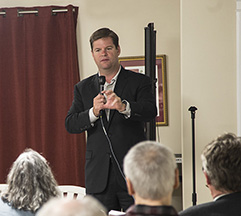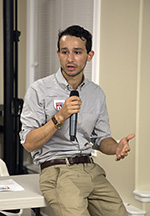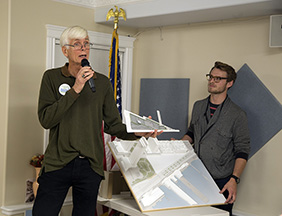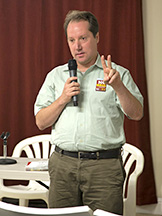Monday, September 30, 2013

Proposition A deals with San Francisco city retiree health care benefits. District 2 Supervisor Mark Farrell, author of the proposition, informed the audience that the city has a $4.4 billion unfunded liability for these benefits, and that they are currently being paid out of the city’s general fund, although there is a retiree health care trust fund. He stated that as things now stand, beginning in 2020, the city can “raid” the existing retiree health care trust fund for uses other than health care costs. Supervisor Farrell indicated that Proposition A prohibits assets of the trust fund from being touched until it is fully funded and additionally ensures that the fund only be used for retiree health care costs.
Proposition D is a measure designed to enact a policy declaration about the city’s expenditures for prescription drugs. John Baldo, Campaign Manager for Yes on D, said that the city spends $23 million every year on prescription drugs. Proposition D would establish a policy that the city use “all available opportunities” to reduce the cost of these drugs and would further establish a policy that the city ask its state and federal government representatives to sponsor legislation “to reduce by one third the drug prices paid by all levels of government.” Mr. Baldo stated that the city currently negotiates with drug manufacturers regarding their prices, and this practice would continue if the proposition were approved. He also said that if Proposition D were approved, it would not cost the city any additional funds.
Propositions B and C are aimed at a proposed waterfront condominium development known and discussed in local news media as “8 Washington.” This development would be located near the Embarcadero Center. The city’s planning department has approved the project, allowing part of the project to be built at 136 feet high, which is 52 feet higher than the existing 84-foot height limit, and the Board of Supervisors voted in favor of this. Proposition C asks whether the Board of Supervisors’ decision should be approved, while Proposition B describes the project in detail and also contains other provisions regarding administrative appeals. Any person who is opposed to “8 Washington” would have to vote “No” on both propositions; if either one passes, the project will move forward.
Alec Bash, who said he is a volunteer with the campaign “Open Up the Waterfront” (i.e., the campaign in favor of the development), spoke in favor of the measures. He provided a very detailed description of the development, including a visual mock-up of the project and surrounding structures. Mr. Bash stated that the “major impact” of the proposed condominium development would be the loss of tennis courts that currently exist on the site, and the loss of views in various other neighborhood residential units and the lower units of the Embarcadero Center. He stated that the development would provide 200 underground parking spaces, would bring in around $7 million into the city coffers each year. He also stated that 25% of the site would be open space.
Jon Golinger, campaign director for “No Wall on the Waterfront” (i.e., the campaign opposed to the development), said that the whole point of the propositions is to raise waterfront height limits and have nothing but luxury condominiums along the city waterfront. He said that Proposition B not only raises these limits, but also rewrites the city’s planning rules review process to make it impossible to challenge a new project once it has been approved. Mr. Golinger challenged Mr. Bash’s characterization of the degree and nature of open space on the site. He also pointed out that there will be no affordable units in the particular development and that the developer will making only an $11 million contribution to the city’s affordable housing fund, while each of the project’s 134 units will sell for millions of dollars.


